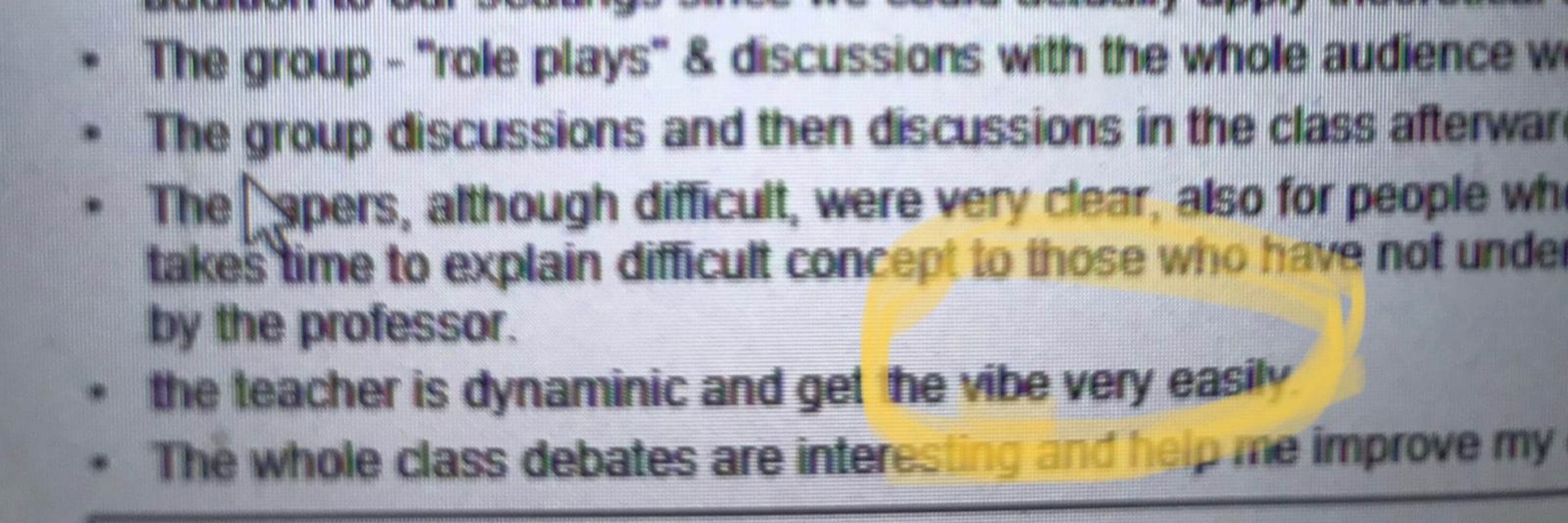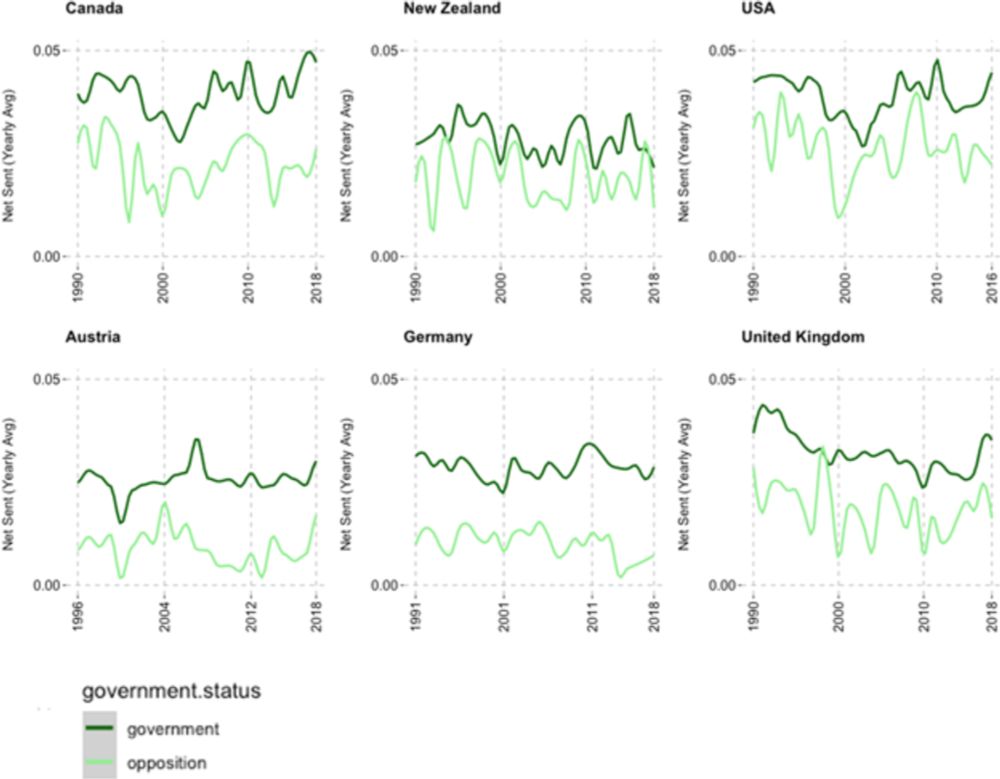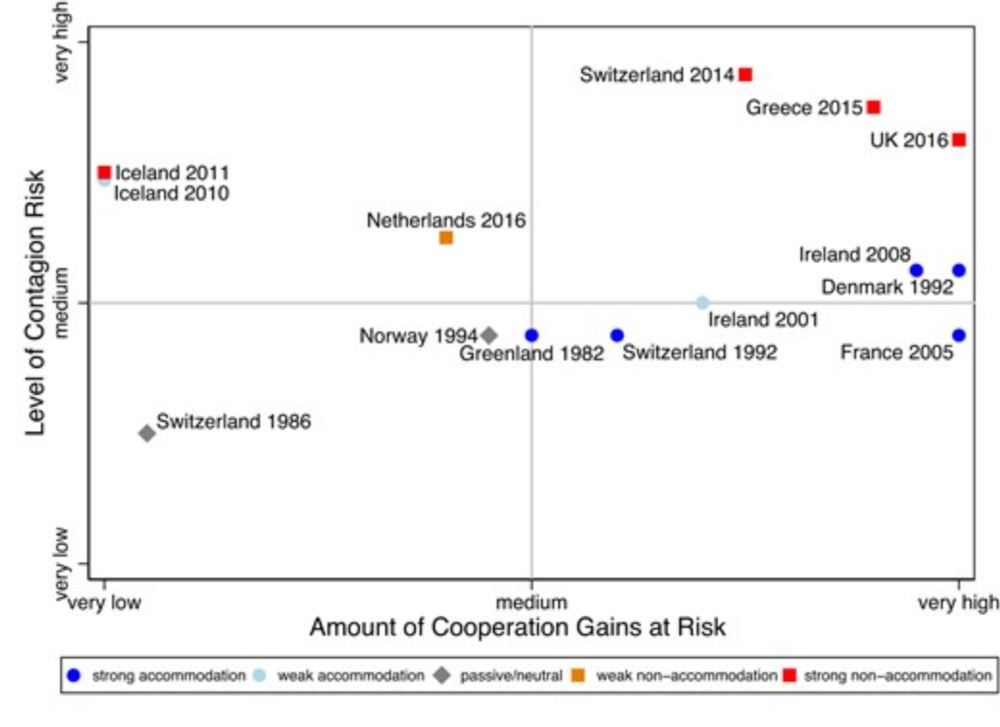
Scherzinger
@scherzinger.bsky.social
Political Scientist at the @UZH. IR good stuff & quant text analysis. Former Berliner, adopted Zürcher.
Website: https://johannesscherzinger.com/
Website: https://johannesscherzinger.com/
Reposted by Scherzinger
🚨 New(ish) Publication Alert! Delighted to see my article Credit Claiming in the EU @thejop.bsky.social I explore a classic question for accountability in Europe: when and why do govs claim credit for the work of the EU and shift blame onto Brussels to avoid responsibility? doi.org/10.1086/732970

Credit Claiming in the European Union | The Journal of Politics: Vol 87, No 3
Incumbents in multilevel systems are assumed to exploit uncertainty of responsibility by claiming credit and shifting blame, yet little is known about when and how they engage in these rhetorical stra...
doi.org
October 8, 2025 at 11:02 AM
🚨 New(ish) Publication Alert! Delighted to see my article Credit Claiming in the EU @thejop.bsky.social I explore a classic question for accountability in Europe: when and why do govs claim credit for the work of the EU and shift blame onto Brussels to avoid responsibility? doi.org/10.1086/732970
Reposted by Scherzinger
Reposted by Scherzinger
Perfect day for a Lehrstuhlausflug!

September 19, 2025 at 10:34 AM
Perfect day for a Lehrstuhlausflug!
Reposted by Scherzinger
UN funding is under pressure. In a new article @the-peio.bsky.social, my colleagues Alex Tokhi and Lisbeth Zimmermann (@goetheuni.bsky.social) show that the participation of far-right parties in government has significant negative effects on the funding of IOs.
link.springer.com/article/10.1...
link.springer.com/article/10.1...

The far right and international organizations: How the far right in government affects foreign aid funding - The Review of International Organizations
The far right is on the rise, winning elections, entering governments globally, and politicizing international cooperation. Existing research finds only very limited effects of far-right governments on international organizations (IOs), however.. We argue that the far right in government undermines IOs by systematically reducing their earmarked funding, as it cannot fully align its anti-migration agenda with the liberal mandates and purposes of most IOs. Using new data on earmarked funding to IOs from 37 OECD donor states between 1990 and 2020, we examine how far-right participation in government affects IO funding. Expanding the data on far-right parties beyond Western Europe, we employ three-way fixed effects and dynamic balancing weights to address both static and dynamic confounding with marginal structural models. Our results show that governments with far-right parties reduce earmarked funding contributions to IOs by almost 30%, without affecting bilateral aid commitments. This suggests that the far right not only politicizes IOs but also attempts to directly undermine their operation when IOs cannot be aligned with their anti-migration agenda.
link.springer.com
August 20, 2025 at 6:58 PM
UN funding is under pressure. In a new article @the-peio.bsky.social, my colleagues Alex Tokhi and Lisbeth Zimmermann (@goetheuni.bsky.social) show that the participation of far-right parties in government has significant negative effects on the funding of IOs.
link.springer.com/article/10.1...
link.springer.com/article/10.1...
Reposted by Scherzinger
DISINTEGRATION data feature #1: A 6-wave EU-wide panel survey (2017–2019) of 10,000+ respondents per wave across all 28 member states. Tracks EU attitudes, Brexit perceptions & political views—country-level analyses possible for FR, DE, IT, PL, ES & UK.
doi.org/10.48573/4bj...
doi.org/10.48573/4bj...

DISINTEGRATION: Tracking Europeans' opinions of Brexit and the EU: An EU-wide, six wave cross-sectional survey, 2017–2019
Brexit marked a turning point in EU history. For the first time an EU member state left the EU, leading to concerns about the stability of the EU as a whole. Indeed, Brexit carried significant spillov...
doi.org
May 20, 2025 at 8:55 AM
DISINTEGRATION data feature #1: A 6-wave EU-wide panel survey (2017–2019) of 10,000+ respondents per wave across all 28 member states. Tracks EU attitudes, Brexit perceptions & political views—country-level analyses possible for FR, DE, IT, PL, ES & UK.
doi.org/10.48573/4bj...
doi.org/10.48573/4bj...
Reposted by Scherzinger
DISINTEGRATION publ #14: How do international institutions respond to unilateral challenges like non-compliance or withdrawal? @stefwalter.bsky.social & Nicole Plotke-Scherly develop a framework showing how IOs balance cooperation losses vs. contagion risks.
doi.org/10.1093/isq/...
doi.org/10.1093/isq/...

Responding to Unilateral Challenges to International Institutions
Abstracts. How do international institutions respond to unilateral challenges by its member states, such as non-compliance, blocking of reforms, renegotiat
doi.org
May 19, 2025 at 1:05 PM
DISINTEGRATION publ #14: How do international institutions respond to unilateral challenges like non-compliance or withdrawal? @stefwalter.bsky.social & Nicole Plotke-Scherly develop a framework showing how IOs balance cooperation losses vs. contagion risks.
doi.org/10.1093/isq/...
doi.org/10.1093/isq/...
Reposted by Scherzinger
DISINTEGRATION publ #13: IOParlspeech—600k+ parliamentary statements on IOs across 6 countries (1990–2018). @stefwalter.bsky.social & @tommccraehunter.bsky.social show that radical/opposition MPs speak more negatively about IOs, and auhtoritative IOs receive more attention.
doi.org/10.1007/s115...
doi.org/10.1007/s115...

International organizations in national parliamentary debates - The Review of International Organizations
This data article introduces IOParlspeech, an original dataset of over 600,000 statements on international organizations (IOs) in parliamentary debates in six countries between 1990 and 2018. We expla...
doi.org
May 16, 2025 at 11:03 AM
DISINTEGRATION publ #13: IOParlspeech—600k+ parliamentary statements on IOs across 6 countries (1990–2018). @stefwalter.bsky.social & @tommccraehunter.bsky.social show that radical/opposition MPs speak more negatively about IOs, and auhtoritative IOs receive more attention.
doi.org/10.1007/s115...
doi.org/10.1007/s115...
Reposted by Scherzinger
DISINTEGRATION publ #12: When publics grow more Eurosceptic, do parties follow? In FR, IT & UK, mainstream parties adjusted positions but strategically decreased salience of EU issues. Study by @giorgiomalet.bsky.social and Cyrille Thiébaut
doi.org/10.1111/1475...
doi.org/10.1111/1475...

Silent responsiveness: How public opinion affects party discourse on wedge issues
How does public opinion affect political discourse on issues that parties struggle to deal with? Although scholars tend to analyse party–voter linkages in terms of policy positions, parties can respo....
doi.org
May 15, 2025 at 8:40 AM
DISINTEGRATION publ #12: When publics grow more Eurosceptic, do parties follow? In FR, IT & UK, mainstream parties adjusted positions but strategically decreased salience of EU issues. Study by @giorgiomalet.bsky.social and Cyrille Thiébaut
doi.org/10.1111/1475...
doi.org/10.1111/1475...
Reposted by Scherzinger
DISINTEGRATION #10: How did parties in the EU react to Brexit? Analyzing parliamentary statements, @tommccraehunter.bsky.social finds that after the referendum, Eurosceptic challengers moderated their tone, while mainstream parties ramped up pro-EU rhetoric. No domino effect
doi.org/10.1080/1350...
doi.org/10.1080/1350...

Disintegration and party competition: evidence from parliamentary speeches on Brexit
How do political parties in the European Union (EU) react to disintegration bids from a member state? This question is important, as scholars have argued that framing by elites (particularly Eurosc...
doi.org
May 13, 2025 at 1:57 PM
DISINTEGRATION #10: How did parties in the EU react to Brexit? Analyzing parliamentary statements, @tommccraehunter.bsky.social finds that after the referendum, Eurosceptic challengers moderated their tone, while mainstream parties ramped up pro-EU rhetoric. No domino effect
doi.org/10.1080/1350...
doi.org/10.1080/1350...
Reposted by Scherzinger
DISINTEGRATION publ #8 @giorgiomalet.bsky.social and @stefwalter.bsky.social test the “have your cake and eat it, too” argument with voters. Drawing on a panel survey, they show that Brexit had a small but non-negligible impact on Swiss voters’ expectations about EU resolve. doi.org/10.1080/0140...

Have your cake and eat it, too? Switzerland and the feasibility of differentiated integration after Brexit
A key Eurosceptic argument is that countries can selectively retain only those aspects of European integration from which they benefit, while opting out of those aspects they dislike. How convincin...
doi.org
May 9, 2025 at 9:13 AM
DISINTEGRATION publ #8 @giorgiomalet.bsky.social and @stefwalter.bsky.social test the “have your cake and eat it, too” argument with voters. Drawing on a panel survey, they show that Brexit had a small but non-negligible impact on Swiss voters’ expectations about EU resolve. doi.org/10.1080/0140...
Reposted by Scherzinger
DISINTEGRATION publication #5: @stefwalter.bsky.social analyzes how voter-endorsed attempts to withdraw from IOs reverberate abroad. With original survey data from EU-27 Europeans and Swiss voters, she finds both encouragement and deterrence effects. doi.org/10.1177/0010...
Sage Journals: Discover world-class research
Subscription and open access journals from Sage, the world's leading independent academic publisher.
doi.org
May 6, 2025 at 4:22 PM
DISINTEGRATION publication #5: @stefwalter.bsky.social analyzes how voter-endorsed attempts to withdraw from IOs reverberate abroad. With original survey data from EU-27 Europeans and Swiss voters, she finds both encouragement and deterrence effects. doi.org/10.1177/0010...
Reposted by Scherzinger
DISINTEGRATION publication #4: @stefwalter.bsky.social reviews the globalization backlash. She shows that the backlash is not associated with large swings in public opinion against globalization but is rather a result of its politicization by skeptical actors doi.org/10.1146/annu...
The Backlash Against Globalization | Annual Reviews
In recent years, the world has seen a rising backlash against globalization. This article reviews the nature, causes, and consequences of the globalization backlash. It shows that, contrary to a popul...
doi.org
May 5, 2025 at 8:01 AM
DISINTEGRATION publication #4: @stefwalter.bsky.social reviews the globalization backlash. She shows that the backlash is not associated with large swings in public opinion against globalization but is rather a result of its politicization by skeptical actors doi.org/10.1146/annu...
Reposted by Scherzinger
Today marks the final day of the DISINTEGRATION project, a project on the mass politics of disintegration generously funded by the @erc.europa.eu .
We celebrate with a thread on all we have done and found:
1/20
We celebrate with a thread on all we have done and found:
1/20

April 30, 2025 at 10:13 AM
Today marks the final day of the DISINTEGRATION project, a project on the mass politics of disintegration generously funded by the @erc.europa.eu .
We celebrate with a thread on all we have done and found:
1/20
We celebrate with a thread on all we have done and found:
1/20
Reposted by Scherzinger
What a pleasure to reflect on the learnings, achievements and ways forward from the DISINTEGRATION project with former and current team members and our wonderful advisory board at Kloster Fischingen.
Great presentations, a quiz, beer tasting and many ideas for next steps.
Great presentations, a quiz, beer tasting and many ideas for next steps.




April 11, 2025 at 3:46 PM
What a pleasure to reflect on the learnings, achievements and ways forward from the DISINTEGRATION project with former and current team members and our wonderful advisory board at Kloster Fischingen.
Great presentations, a quiz, beer tasting and many ideas for next steps.
Great presentations, a quiz, beer tasting and many ideas for next steps.
Reposted by Scherzinger
Every once in a while, we write articles we truly care about.
This is one of them, and I am so happy and proud to see it published at ISQ:
This is one of them, and I am so happy and proud to see it published at ISQ:

Responding to Unilateral Challenges to International Institutions
Abstracts. How do international institutions respond to unilateral challenges by its member states, such as non-compliance, blocking of reforms, renegotiat
academic.oup.com
March 31, 2025 at 4:01 PM
Every once in a while, we write articles we truly care about.
This is one of them, and I am so happy and proud to see it published at ISQ:
This is one of them, and I am so happy and proud to see it published at ISQ:
Reposted by Scherzinger
Concluding three inspiring and insightful days of talking research and thinking about EU integration, its boundaries, and integration and disintegration dynamics with a fantastic set of people on Monte Verità.




March 12, 2025 at 1:03 PM
Concluding three inspiring and insightful days of talking research and thinking about EU integration, its boundaries, and integration and disintegration dynamics with a fantastic set of people on Monte Verità.
Reposted by Scherzinger
Huge congratulations to @nkortendiek.bsky.social for this well deserved award - Chadwick Alger Prize, the IO Section Best Book Award! 🎉
Buy her book or recommend it to your library!
#ISA2025
Buy her book or recommend it to your library!
#ISA2025
🏆📖🏅 Congratulations @nkortendiek.bsky.social on winning the @isanet.bsky.social IO section best book award 🏆🫶🏻💕
Read the introduction of „Global Governance on the Ground“ for free: academic.oup.com/book/59022
Read the introduction of „Global Governance on the Ground“ for free: academic.oup.com/book/59022
March 5, 2025 at 1:15 PM
Huge congratulations to @nkortendiek.bsky.social for this well deserved award - Chadwick Alger Prize, the IO Section Best Book Award! 🎉
Buy her book or recommend it to your library!
#ISA2025
Buy her book or recommend it to your library!
#ISA2025
Reposted by Scherzinger
***GRAPH OF THE MONTH***
Does media-reported EU policy focus shape legitimacy perceptions? Our new study finds that ideological leanings matter: left-wing voters reward EU focus on regulation & climate, while right-wing voters prefer immigration policies.
Does media-reported EU policy focus shape legitimacy perceptions? Our new study finds that ideological leanings matter: left-wing voters reward EU focus on regulation & climate, while right-wing voters prefer immigration policies.

March 5, 2025 at 1:17 PM
***GRAPH OF THE MONTH***
Does media-reported EU policy focus shape legitimacy perceptions? Our new study finds that ideological leanings matter: left-wing voters reward EU focus on regulation & climate, while right-wing voters prefer immigration policies.
Does media-reported EU policy focus shape legitimacy perceptions? Our new study finds that ideological leanings matter: left-wing voters reward EU focus on regulation & climate, while right-wing voters prefer immigration policies.
Reposted by Scherzinger
How should we study party polarization in Europe?
Happy to share that our paper on *multidimensional* polarization is now out @bjpols.bsky.social! (more 👇)
Happy to share that our paper on *multidimensional* polarization is now out @bjpols.bsky.social! (more 👇)
NEW -
Multidimensional Party Polarization in Europe: Cross-Cutting Divides and Effective Dimensionality - cup.org/4gLJspU
- @jellekoedam.bsky.social, Garret Binding & @mrsteenbergen.bsky.social
Multidimensional Party Polarization in Europe: Cross-Cutting Divides and Effective Dimensionality - cup.org/4gLJspU
- @jellekoedam.bsky.social, Garret Binding & @mrsteenbergen.bsky.social

February 26, 2025 at 9:39 AM
How should we study party polarization in Europe?
Happy to share that our paper on *multidimensional* polarization is now out @bjpols.bsky.social! (more 👇)
Happy to share that our paper on *multidimensional* polarization is now out @bjpols.bsky.social! (more 👇)
Reposted by Scherzinger
Thrilled to see my very first publication online! Many thanks to my great friend and co-author @victoraraujo.bsky.social !!
journals.sagepub.com/doi/10.1177/...
journals.sagepub.com/doi/10.1177/...

Distributive politics and asymmetric participation - Philipp Kerler, Victor Araújo, 2025
How do distributive politics affect participation under incomplete information? We theorize a novel mechanism that we call asymmetric participation, which expla...
journals.sagepub.com
February 14, 2025 at 11:20 AM
Thrilled to see my very first publication online! Many thanks to my great friend and co-author @victoraraujo.bsky.social !!
journals.sagepub.com/doi/10.1177/...
journals.sagepub.com/doi/10.1177/...
Reposted by Scherzinger
"Do external crises unite or divide international organizations? Evidence from 1,443 UNSC resolutions (1995-2018) suggests external crises, like humanitarian disasters, civil conflicts, floods, and terrorist attacks, divide rather than unite the Security Council. Graph by Johannes Scherzinger #UNSC

December 2, 2024 at 2:20 PM
"Do external crises unite or divide international organizations? Evidence from 1,443 UNSC resolutions (1995-2018) suggests external crises, like humanitarian disasters, civil conflicts, floods, and terrorist attacks, divide rather than unite the Security Council. Graph by Johannes Scherzinger #UNSC
Reposted by Scherzinger
Graph of the month:
Analyzing 167 arguments made in 25 direct democratic voting campaigns on international issues in Switzerland, @giorgiomalet.bsky.social and @stefwalter.bsky.social show that the framing of arguments in favor and against international cooperation differ significantly.
Analyzing 167 arguments made in 25 direct democratic voting campaigns on international issues in Switzerland, @giorgiomalet.bsky.social and @stefwalter.bsky.social show that the framing of arguments in favor and against international cooperation differ significantly.

March 28, 2024 at 12:40 PM
Graph of the month:
Analyzing 167 arguments made in 25 direct democratic voting campaigns on international issues in Switzerland, @giorgiomalet.bsky.social and @stefwalter.bsky.social show that the framing of arguments in favor and against international cooperation differ significantly.
Analyzing 167 arguments made in 25 direct democratic voting campaigns on international issues in Switzerland, @giorgiomalet.bsky.social and @stefwalter.bsky.social show that the framing of arguments in favor and against international cooperation differ significantly.
Reposted by Scherzinger
Now published:
How do populist-right parties respond when their preferred policies are implemented abroad? Focusing on Brexit, Marco Martini and @stefwalter.bsky.social show that nationalist parties adjusted their aggressiveness towards the EU in line with the ups and downs of the Brexit process.
How do populist-right parties respond when their preferred policies are implemented abroad? Focusing on Brexit, Marco Martini and @stefwalter.bsky.social show that nationalist parties adjusted their aggressiveness towards the EU in line with the ups and downs of the Brexit process.

March 26, 2024 at 8:09 AM
Now published:
How do populist-right parties respond when their preferred policies are implemented abroad? Focusing on Brexit, Marco Martini and @stefwalter.bsky.social show that nationalist parties adjusted their aggressiveness towards the EU in line with the ups and downs of the Brexit process.
How do populist-right parties respond when their preferred policies are implemented abroad? Focusing on Brexit, Marco Martini and @stefwalter.bsky.social show that nationalist parties adjusted their aggressiveness towards the EU in line with the ups and downs of the Brexit process.
Reposted by Scherzinger
Very happy to share this new article @gsqjournal.bsky.social! Analyzing the perceptions of IO staff, I show that self-legitimation practices of IO leadership can also backfire and destabilize the organization.
Open access here: academic.oup.com/isagsq/artic...
Open access here: academic.oup.com/isagsq/artic...

“Just Theater!”—How Self-Legitimation Practices Can Backfire in International Organizations
Abstract. Working in international organizations (IOs) is not always a pleasure. Contradictory external demands make it difficult to do the right thing, constan
academic.oup.com
February 29, 2024 at 2:02 PM
Very happy to share this new article @gsqjournal.bsky.social! Analyzing the perceptions of IO staff, I show that self-legitimation practices of IO leadership can also backfire and destabilize the organization.
Open access here: academic.oup.com/isagsq/artic...
Open access here: academic.oup.com/isagsq/artic...
Reposted by Scherzinger
Since the mid-2010s, the number of resolutions in the UNSC that have failed or been vetoed has markedly increased, providing another indicator for growing international dissensus amidst a surge of global crises.
Data & Visualization by Johannes Scherzinger.
#UnitedNations
Data & Visualization by Johannes Scherzinger.
#UnitedNations

February 26, 2024 at 10:13 AM
Since the mid-2010s, the number of resolutions in the UNSC that have failed or been vetoed has markedly increased, providing another indicator for growing international dissensus amidst a surge of global crises.
Data & Visualization by Johannes Scherzinger.
#UnitedNations
Data & Visualization by Johannes Scherzinger.
#UnitedNations



